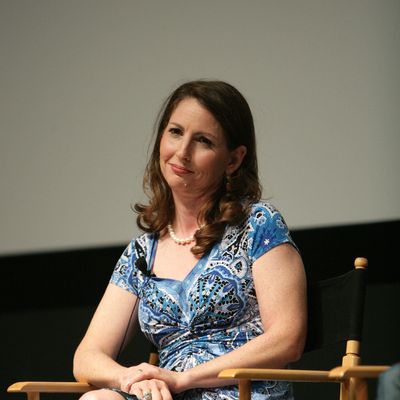
If you were to compile a list of American heroes of social justice, Eva Moskowitz would be near the top. Her network of Success Academy Charter Schools has been a staggering triumph of upward mobility, helping hundreds of mostly poor, mostly minority children selected at random to achieve academic success on par with or even beyond that of wealthy, privileged suburban children. And Moskowitz is a hero to some, but mostly she is a beleaguered figure of controversy.
The reasons for Moskowitz’s controversial standing, as itemized in this mostly favorable New York Times Magazine profile, are many. She makes a lot of money. (“That Moskowitz’s wealthy board members choose to highly reward her track record — her salary and bonus for the 2012-13 school year totaled $567,500 — only adds to the union’s fury.”) She is brusque (“I asked Michael Mulgrew, the president of the union, why Moskowitz stirred such anger in him and his membership. “It’s her conflictual way of approaching everything,” he says. “It’s, ‘I’m going to show we’re better than public schools.’”) She raises money from wealthy people. (“[Diane] Ravitch indicted the hedge-fund titans and business moguls — including Kenneth Langone, a founder of Home Depot, and the Walton family of Walmart — who put their weight behind promising charter schools, leading their boards and lending political clout.”)
Given that brusqueness was also the thing that annoyed people about Michelle Rhee, I would guess it is an occupational requirement for a driven idealist who struggles against an entrenched bureaucracy. I have no particular problem with a person who successfully educates underprivileged children earning half a million dollars or raising money from otherwise unsavory characters. I’m more interested in the fact that Moskowitz’s schools, which are open to all and take applicants by random lottery, produce eye-popping test scores whose performance stands the test of rigorous controlled studies. Moskowitz’s network hires non-union teachers, who are paid well but can be fired for non-performance and provide their students with extended learning time.

Not long ago, I described the split within the Democratic Party as centering around “whether public services should be designed for the benefit of providers or consumers.” Some readers objected that that description, and fair enough — opponents of education reform certainly do argue that their policies would benefit children. But it is also demonstrably true that some of the opposition to education reform is driven by a belief that it unduly prioritizes educational results over the welfare of incumbent teachers.
One recent Washington Post column defended teacher tenure laws specifically as a means of preserving jobs for the black middle class. The author, Andre M. Perry, did a poor job of defending his thesis even on its own terms — he asserted that eliminating tenure laws leads to a reduction in black teachers without presenting any data to support the claim. Indeed, according to the National Education Association, 30 percent of charter-school teachers are minorities, compared to 17 percent of traditional public-school teachers. (The comparison is not perfectly fair to traditional public schools, since charters operate disproportionately in urban areas.) But that is beside the point. More noteworthy is Perry’s frank admission that urban schools should not maintain a singular mission of educating children, but should balance that mission with providing jobs to adult employees:
The education-reform community has convinced us that closing the achievement gap by any means necessary is a worthy, final end. No. Education is just one path toward a stronger community. …
Schools should develop minds, train future workers and enrich communities through employment opportunities for its members.
The same premise comes through in a column by Justin Minkel, published in Valerie Strauss’s anti-education reform blog. Minkel argues, “We don’t need to swap out all the bad and mediocre teachers for better teachers, anymore than we should swap out our struggling students for more advanced students.”
If you believe schools should be designed solely to promote education, then this equivalence is bizarre: Getting a quality education is a universal right, while holding a teaching job is not. Why should we treat these conditions as equivalent? On the other hand, if you consider teachers and students to be stakeholders with equal rights, to be balanced about equally, then the anti-reform line makes obvious sense.
Update: Since numerous comments have complained about it, this seems like a good time to bring up in a more sustained way my wife’s work. My wife, Robin Chait, works in education. She currently works for Center City Public Charter Schools in Washington.
Robin has worked in a number of capacities: as an analyst at the U.S. Department of Education, as a public school teacher in Washington via the D.C. Teaching Fellows program, as an analyst at the Center for American Progress and then at the Office of the State Superintendent of Education.
Do I claim my views are independent of Robin’s? Absolutely not: My views are utterly dependent on hers. Enjoying the benefit of her deep, thoughtful knowledge of education policy is one of the smaller perks of being married to Robin Chait. I have learned more about education from Robin than anybody else, though she should not be held responsible for my writing, since, among other reasons, my grasp of the issue pales next to hers.
It is clearly the case that Robin broadly favors education reform. As the chronology of her career demonstrates, the causal mechanism is: Robin supports education reform –> Robin works for charter schools, as opposed to the reverse.
I have brought up her work before, and the reason I haven’t done so more often is that I’ve been reluctant to boast. If my meager attempt at modesty appears to some critics to be a form of subterfuge, this is the opposite of my intention. I am extremely proud of my association with her. If you think I am a proxy for Robin’s views on education policy, you are giving me far more credit than I deserve. I wish I knew enough about education policy for that to be true.






























